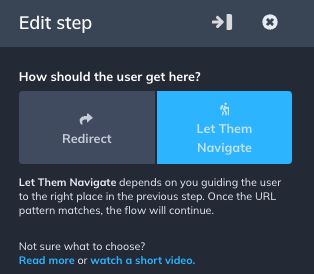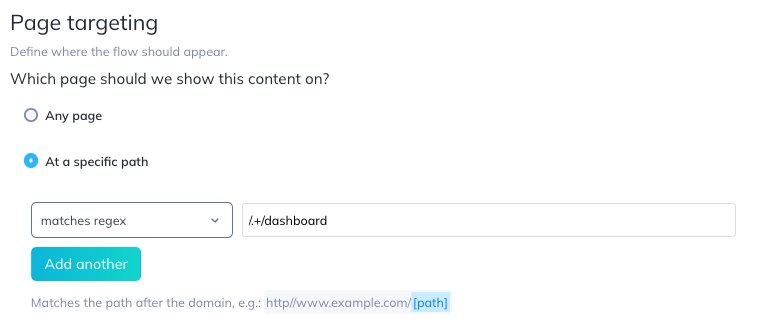Consejo profesional: comodines vs. expresiones regulares
Aprenda cuándo utilizar un comodín o un patrón Regex.
Cuando comenzamos a crear flujos, definitivamente puede resultar confuso saber cuándo debemos recurrir a comodines (*) o cuándo debemos usar expresiones regulares (.+ por ejemplo).
A modo de comparación, el símbolo comodín (*) solo se aplica cuando se usa en la función "Permitirles navegar" que viene con la función "Navegar" de Appcues Builder , que se abre mediante la extensión de Chrome Appcues . Esto se usa cuando se desean crear flujos en páginas dinámicas o páginas donde la ruta es única para cada usuario.

Por el contrario, los patrones de expresiones regulares se utilizan para definir las páginas en las que se publicará el flujo. Con expresiones regulares, se puede tener un control más preciso sobre qué se puede incluir o excluir, en lugar de usar el símbolo "todo vale", como el comodín. Los patrones de expresiones regulares se utilizan en la sección "Segmentación de página" de la página de configuración del flujo en Appcues Studio y se combinan con la condición " coincide con la expresión regular ".

En general, si bien parece que logran la misma función al configurar rutas dinámicas, tienen aplicaciones distintas en Appcues : los comodines (*) se usan en el Builder para "Permitirles navegar" (indicando Appcues dónde debe aterrizar un usuario), mientras que los patrones de expresiones regulares (como .+) se usan en Studio para configurar la sección de orientación de la página (indicando Appcues dónde mostrar el flujo/ checklist ).